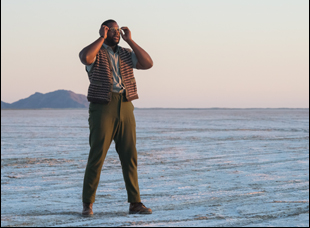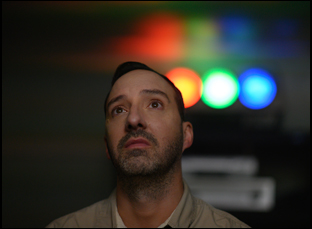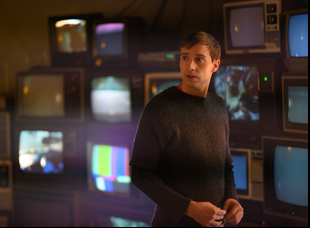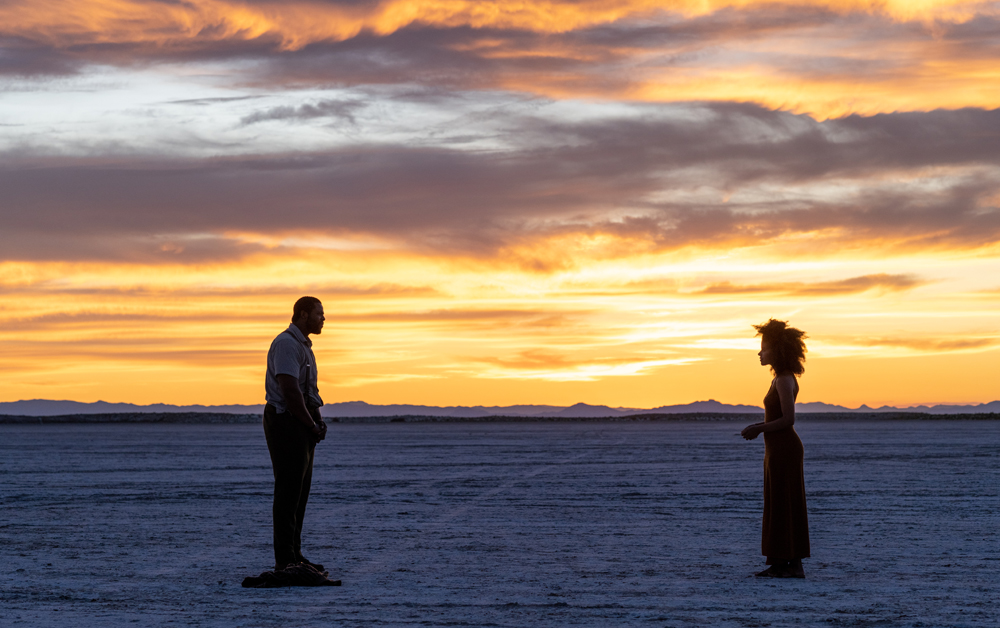At the end of the shoot for “Nine Days,” Edson Oda asked his lead actor Winston Duke to do something meaningful for himself. The production had set aside time in the glorious Great Salt Lake Desert to film its finale, which was bound to be intimidating for any actor when it involved a seven-page monologue, but being in such a special environment and after achieving such an impressive feat, he wanted Duke to take in the moment and have the same cathartic feeling of release that his character, the enigmatic and bespectacled Will did, yielding a performance that wasn’t exactly acting and is bound to be as memorable for the actor as it is for an audience.
That Oda wanted to create as special experience for those involved in the making of his debut feature as those who would watch the final product speaks to what inspired him to write “Nine Days” in the first place, hoping to honor his uncle who loved movies so much he used to draw his own posters for whatever Hollywood put out. “A kind, gentle soul,” as Oda recalled just after the film’s premiere at Sundance, his uncle tragically took his own life when the director was 12, leaving the question of why when he had meant so much to others. Naturally, Oda set about finding an answer for himself in art, drawing on his background as a wildly inventive commercials and music video director to create an ambitious first feature like no other in settling into an otherworldly waystation for souls looking to attach themselves to a human host, with a theoretically impartial arbiter in Will, who gives candidates nine days to prove they deserve a life on earth.
Only Will has the experience of “being human,” which he frankly wasn’t all too impressed with, but as he looks at the candidates, played by a wonderful ensemble of actors including Zazie Beetz, Tony Hale, Arianna Ortiz, Bill Skarsgard and David Rysdahl, he is measuring survivability in a world that isn’t always kind, evaluating those in front of him for the right mix of curiosity and cynicism — innate goodness won’t get you all the way, nor will cruelty — and his tests of character reveal as much about him and it does about everyone else, all of whom are competing for an experience they don’t know what will be entailed nor what qualities make them suited for it as they look at videos from earth intended to spark reactions.
The complicated calculus should be too profound to comprehend by mere mortals, yet Oda movingly appeals to what makes us all human as he constructs an endearingly analog process to play out where Will and his helper Kyo (Benedict Wong) show compassion to candidates in literally building a simulation of life for those he’s forced to dismiss and showing the weight of making such decisions has on Will, who’s been compromised in his ability to judge how others will live when he’s become inured to his own experience and has lost sight of what made him special enough to be given such responsibilities. “Nine Days,” however, never loses its sensitivity and feels alive throughout, with moments of liberation built in throughout to exude whatever its characters find themselves holding in and after a year in which collective we could all use a breath of fresh air, the film is making its way into theaters following its debut at Sundance where Oda won a Waldo Salt Screenwriting Award before the pandemic shut the world down. On the eve of its release, he spoke about how he has able to follow through on his truly unique vision and how he now finds himself taking inventory of meaningful moments as his characters do on screen.

It’s interesting. For the audience, yes, I never wanted to just explain everything [in] the same way we don’t know all the answers when you’re alive because we don’t know where it comes from. What is the purpose [of life]? I wanted to leave the same kind of questions in the air, so the audience [could] fill in the gaps, the same way we fill in the gaps [about] the concepts of the universe and life. And in talking to the actors, I wouldn’t give them more information than they would have in their reality as characters. Even in their backstories, [where I could be like], “Yeah, this is how I see it,” but I [would ask] how would you see where this character came from or their background?” It was very interactive in this way.
And I didn’t have a very, very clear idea of what this movie would be until things just started to come together and it was great just seeing the actors reading lines and interacting with one another and discovering who those characters were. It was just a great learning process observing them and seeing how they would react in those environments with Will and how Will would react with the candidates.
What was it interesting working on how to make the recreations of life tangible for the candidates?
I wanted them to be nostalgic, but not to be graspable in terms of nostalgia – it’s there, but you can’t touch it somehow. I also wanted nothing to do with technology, [where it’s] like childhood or theater when you’re a kid and you have to recreate something with the resources you have at the place. I wanted it to be a representation of that period where there’s a purity and it’s a time when imperfection is still allowed and that’s kind of charming. That’s why it’s very theatrical.

It came from Antonio Pinto, the composer, so I sent the scene and he came up with that song, and I think he had something with another person and then he rewrote it in Portuguese. He’s Brazilian [as I am], and I was so happy when I watched it with the music. He is a brilliant man and I was always a huge fan of his work, since I was a kid. I watched movies like “Central Station” and “City of God” and “Senna,” which is a documentary I adore, so just having a chance to work with him and learn from him was an amazing experience, but at the same time, having him so hard and pour all his heart into it was just unbelievable.
From what I understand, the scenes of life that the candidates watch on televisions all were shot shortly before you went into the production. What was it like gathering footage?
It was complicated. We wanted to do it practical, on camera before we started shooting [with the cast], so we wouldn’t be compositing later. we wanted those TVs to already have those images instead of putting everything on green screen, so while we were in preproduction, we were already shooting those things and it was a lot of fun because everything was on helmets, you’re just filming in POV, but it was very, very complicated in the sense that we needed very, very specific things coming from all over the world. I don’t know if you notice, but some scenes happen in Brazil and others scenes happen in Los Angeles, so we needed not necessarily specific locations, but [it needed to be] in Brazil if you would have to address they were from there.

What’s it like to finish your debut feature and have it go out into the world?
It’s just such a great feeling, but at the same time, what I’m trying to do is just go back a little bit and just write down things about why I made the movie. It’s easy to lose yourself in this process and [be like] “Oh yeah, the audience and critics and reviews,” and now I’m just trying to remember those little moments like Emma [played by Zazie Beetz] did, just going back and [write down] what I love about this movie, like this dinner I had with the crew or things that we’ve done or funny moments. That’s the special part of making a movie.
“Nine Days” opens on July 30th in New York and Los Angeles and expands nationally on August 6th.




